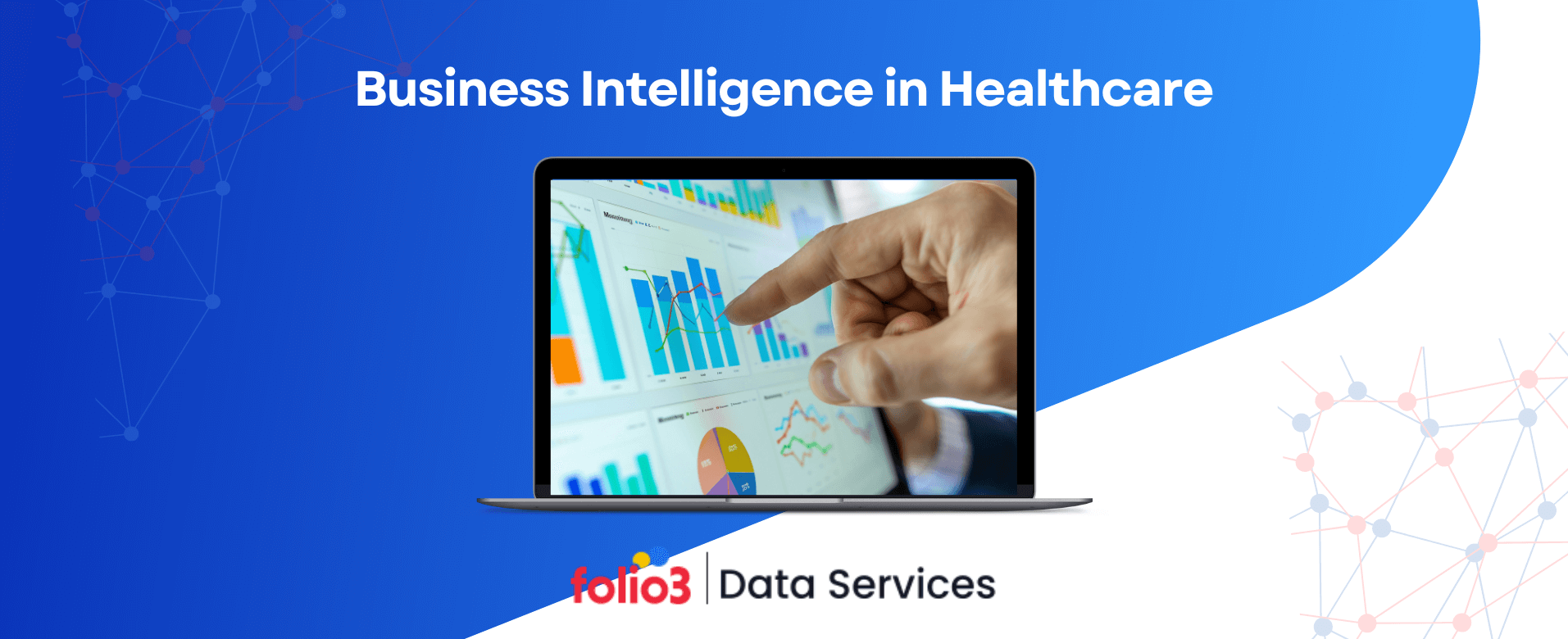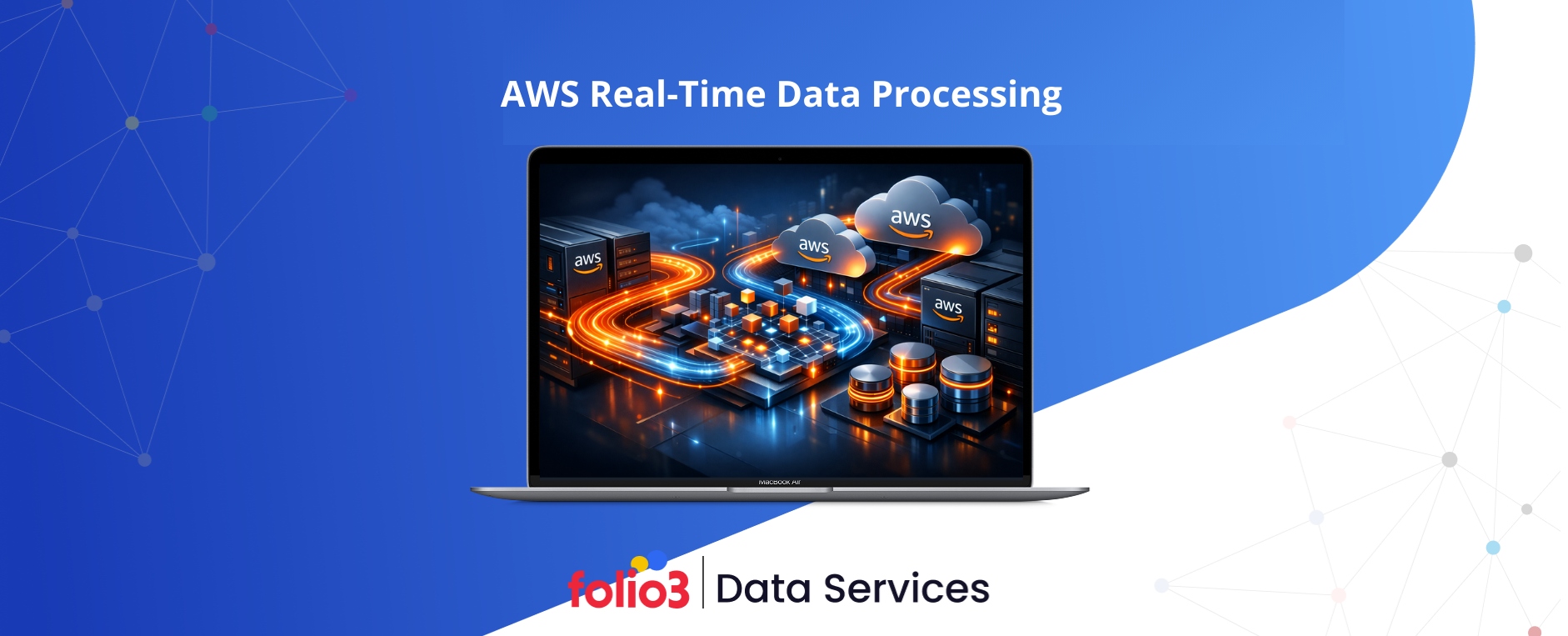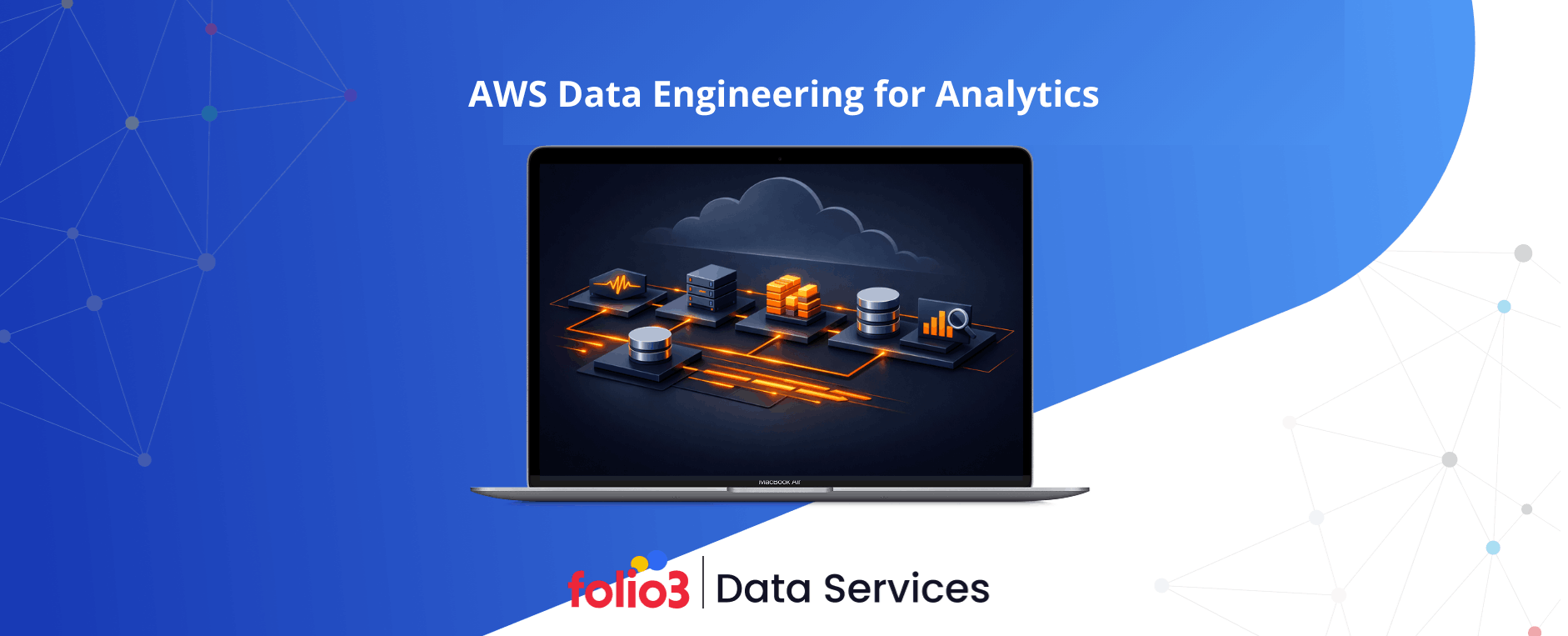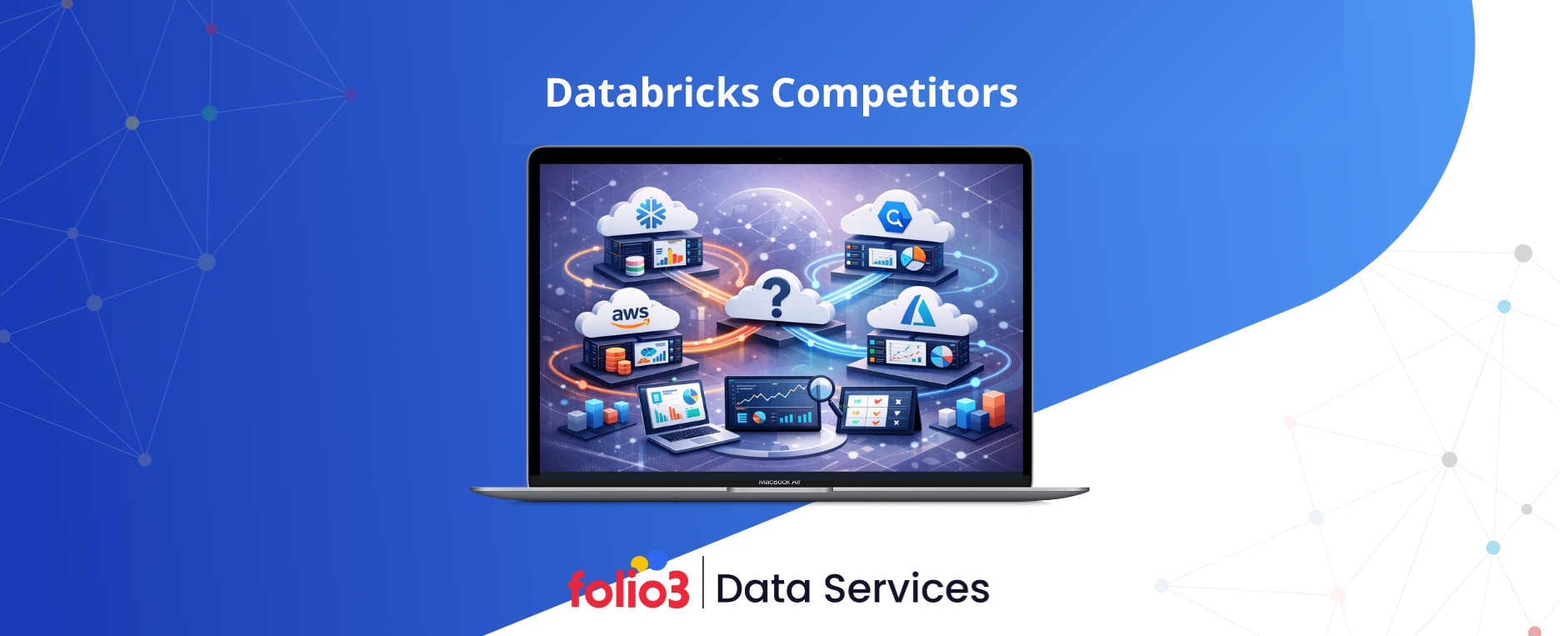Every decision in healthcare carries weight — whether it’s optimizing patient outcomes, managing costs, or allocating resources effectively. With vast volumes of patient records, diagnostic data, and operational metrics generated daily, making sense of it is no small task.
This is where business intelligence in healthcare transforms raw data into clear, actionable insights that drive smarter, faster decisions across hospitals, clinics, and health systems. The importance of BI in the healthcare sector goes beyond dashboards and data charts.
It plays a vital role in identifying trends in patient care, minimizing clinical errors, improving resource planning, and even predicting disease outbreaks. This growth underlines the sector’s increasing reliance on data-backed strategies to improve outcomes and stay ahead in a competitive, highly regulated environment.
In this article, we’ll explain how BI in healthcare is transforming operations across the industry. We’ll explore its key benefits, challenges, and use cases, examine how to choose the best business intelligence software for healthcare and examine real-world applications of a healthcare business intelligence platform.
Key Applications of Business Intelligence in Healthcare
As healthcare continues to evolve, the demand for data-driven strategies has grown significantly. Business intelligence in healthcare isn’t just about data visualization — it’s about improving care delivery, organizing internal processes, and making informed decisions that impact both lives and bottom lines. A strong business intelligence strategy ensures healthcare organizations derive maximum value from their data.
Below are some of the most impactful applications of BI in the sector:
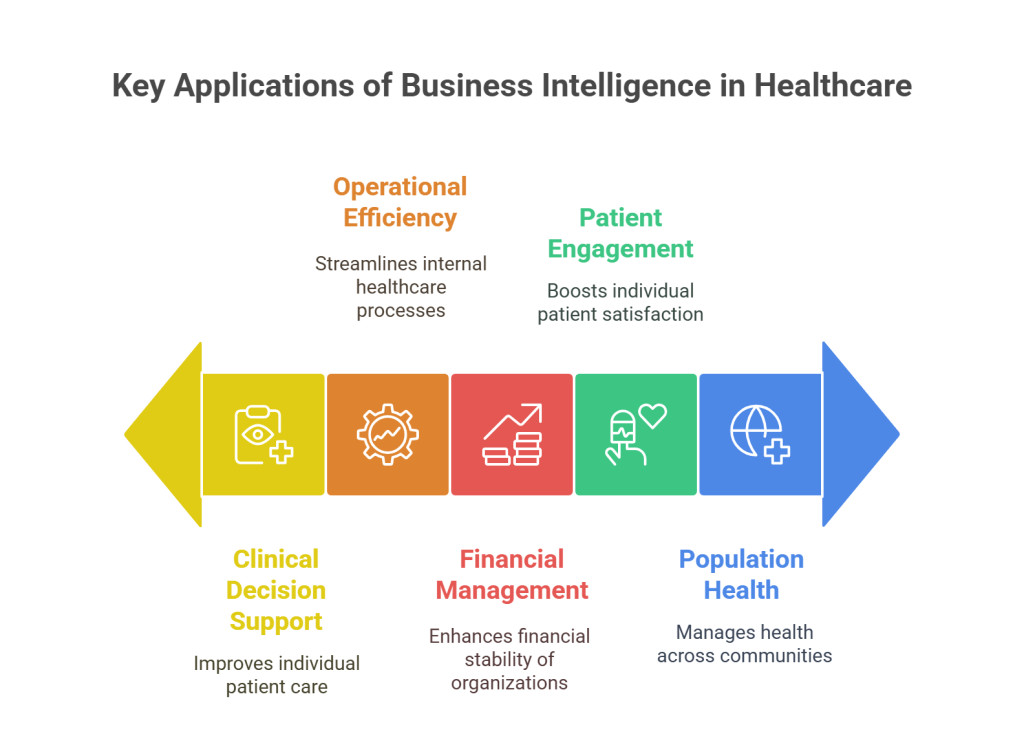
A. Clinical Decision Support
One of the most powerful uses of BI in healthcare is its role in clinical decision-making. By consolidating patient data from electronic health records (EHRs), lab results, prescriptions, and diagnostic tools, BI systems help doctors and nurses make more informed choices at the point of care.
For example, a BI system can flag potential medication interactions, predict complications based on patient history, or identify gaps in care protocols. Using clinical decision support tools powered by BI led to a 35% improvement in early diagnosis of chronic conditions like diabetes and heart disease.
B. Operational Efficiency
Running a healthcare facility requires more than medical expertise—it demands efficient operations. From managing appointment schedules and bed occupancy rates to reducing emergency room wait times, business intelligence reporting is key to streamlining day-to-day functions.
Take staffing, for instance. A BI dashboard can reveal peak hours for patient visits, helping administrators schedule enough nurses and physicians during high-traffic times. Hospitals that implemented BI tools for operational analysis saw a 22% reduction in average patient wait times, according to HIMSS Analytics. The ability to act on real-time data makes a measurable difference in patient flow and resource utilization.
C. Financial Management
Keeping finances in check is another critical area where business intelligence in healthcare proves invaluable. Healthcare organizations often deal with complex billing structures, insurance claims, and reimbursement models. With BI, finance teams can more efficiently track revenue cycles, detect billing inconsistencies, and monitor cost centers.
A well-implemented healthcare business intelligence platform provides clear visibility into operational costs, patient billing patterns, and payer reimbursements. This enables more innovative budgeting and more accurate forecasting.
D. Patient Engagement and Satisfaction
Patients today expect transparency, timely communication, and personalized care. BI supports this by analyzing feedback, behavior patterns, and communication preferences to improve patient interactions. Through integrated dashboards, providers can track satisfaction surveys, appointment adherence, and even how frequently patients access their portals.
When patients are more engaged, outcomes improve. By integrating information technology to improve patient care, OSUMC saw inpatient satisfaction scores on the Hospital Consumer Assessment of Healthcare Providers and Systems (HCAHPS) survey rise from 56% to 71% between 2006 and 2009 — a clear demonstration of business intelligence benefits in patient satisfaction and trust.
E. Population Health Management
One of the most transformative applications of BI in healthcare is population health. By analyzing data across demographics, locations, and medical histories, healthcare systems can spot trends, predict outbreaks, and proactively manage chronic illnesses at scale.
For example, BI tools can track spikes in reported symptoms during flu season, enabling clinics to allocate vaccines where they’re needed most. In a broader sense, population health dashboards help public health officials plan initiatives and monitor progress. BI-enabled population health efforts led to a 12% drop in preventable hospital readmissions in systems that used predictive models for chronic care management.
Benefits of Implementing BI in Healthcare
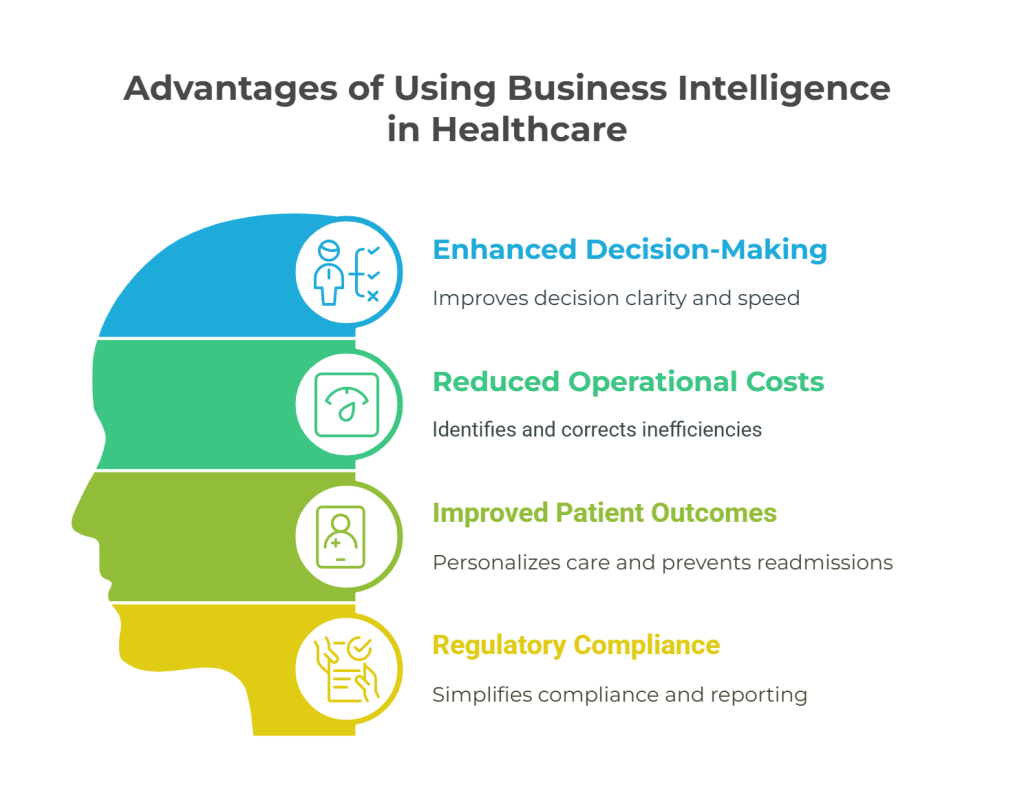
Adopting business intelligence in healthcare isn’t just about keeping up with trends — it’s about building smarter systems that support better care, smarter operations, and long-term growth. Below are the core benefits BI brings to healthcare organizations of all sizes.
1. Enhanced Decision-Making
Whether a hospital administrator evaluates staffing needs or a physician reviews a complex patient history, BI in healthcare clarifies complex decisions. By turning data into visual insights through modern healthcare data analytics services, decision-makers can quickly identify patterns and act on them.
With the right healthcare business intelligence platform, even non-technical staff can access and interpret key data, reducing the guesswork that often delays crucial decisions.
2. Reduced Operational Costs
Rising costs are one of the biggest challenges in healthcare, but BI offers a clear solution. Organizations can spot inefficiencies early and correct them before they become costly by tracking supply usage, staffing efficiency, patient flow, and billing processes.
3. Improved Patient Outcomes
Better data leads to better care. With BI tools analyzing lab results, medication history, and treatment timelines, clinicians can personalize treatment plans and intervene earlier in high-risk cases. This proactive approach is essential in managing chronic conditions and preventing readmissions.
Healthcare organizations using predictive BI tools reduced hospital readmission rates by 18%, especially in patients with heart failure and diabetes. These tools help identify gaps in care plans, track recovery progress, and ensure follow-ups aren’t missed — all contributing to improved health outcomes.
4. Regulatory Compliance and Reporting Ease
Compliance with health regulations like HIPAA, MACRA, and CMS reporting standards can be overwhelming — especially when done manually. A robust healthcare business intelligence platform simplifies this process by organizing compliance-related data and automating the generation of required reports.
BI tools help organizations meet their regulatory obligations without scrambling through spreadsheets or disjointed systems. More importantly, they support data accuracy and audit readiness. In fact, according to Health IT Analytics, healthcare providers using BI-based compliance and reporting services report a 30–40% reduction in audit-related administrative hours.
How Do You Get Started With BI in Healthcare?
Embracing business intelligence in healthcare may seem like a massive undertaking, but with a structured approach, it becomes a transformative process. Whether you’re a small clinic or a large hospital system, the key is to start where you are and build strategically. Here’s a breakdown of how healthcare organizations can lay a solid foundation for BI success.
1. Assessing Current Data Infrastructure
Before implementing any software or tools, examine your existing data landscape closely. What systems are already in place? Are your electronic health records (EHRs), billing software, lab systems, and scheduling platforms integrated, or are they siloed?
Understanding your current state helps identify gaps, redundancies, and opportunities for improvement. A surprising number of healthcare organizations operate without a unified data strategy. Start with a data audit. Map out your data sources, evaluate data quality, and pinpoint areas where real-time visibility is lacking.
2. Selecting the Right BI Tools
Choosing the best business intelligence software for healthcare is a critical step. Look for solutions that are HIPAA-compliant, scalable, and capable of integrating with your existing platforms. Ideally, the software should offer user-friendly dashboards, customizable reporting, and real-time data access.
Don’t just chase features — focus on functionality that aligns with your organization’s goals. Are you aiming to reduce patient wait times? Improve revenue cycle management? Track clinical KPIs? Let your goals guide your software selection.
A study involving a large behavioral health care provider demonstrated that adopting a data-driven clinical productivity system led to a 30% increase in revenue, a 10% rise in clinical percentage, and a 25% improvement in treatment plan completion within three months.
3. Training Staff and Creating a Data-Driven Culture
Technology alone isn’t enough — your team must know how to use it. This means training staff at all levels to interpret and act on BI insights. From physicians and nurses to finance and admin teams, everyone makes data part of the daily workflow.
More importantly, encourage a culture where data is seen as a tool for support, not surveillance. Highlight success stories, celebrate improvements based on BI-driven decisions, and provide ongoing training to keep up with tool updates or new metrics. Organizations that invested in comprehensive BI training and change management saw a 40% increase in data usage across departments.
4. Partnering with BI Service Providers
If your in-house resources are limited or your data infrastructure is complex, working with an experienced healthcare business intelligence platform provider can accelerate implementation and reduce risk. These partners help with setup and integration and assist in customizing reports, automating workflows, and ensuring compliance.
A good BI partner understands healthcare challenges — from regulatory requirements to patient privacy — and helps tailor the solution to your unique needs. This partnership approach can shorten the implementation timeline and lead to faster ROI.
Look for service providers with a strong track record in the healthcare domain, like Folio3, who specialize in designing scalable, secure, and user-centric BI solutions for the industry.
FAQs
What is business intelligence in healthcare?
Business intelligence in healthcare refers to using data analytics tools to improve decision-making, patient outcomes, and operational efficiency. It helps hospitals and providers gain actionable insights from clinical, financial, and administrative data.
What are the four types of business intelligence?
The four main types are descriptive (what happened), diagnostic (why it happened), predictive (what might happen), and prescriptive (what should be done) analytics. Each helps inform strategic decisions at different levels.
What is business intelligence, for example?
Business intelligence is the process of collecting and analyzing data to make smarter decisions. For example, a hospital might use BI dashboards to track ER wait times and reduce delays. It turns raw data into meaningful insights.
What is the role of artificial intelligence in the healthcare industry?
AI supports healthcare by enhancing diagnostics, predicting patient risks, automating administrative tasks, and personalizing treatment. It improves efficiency and accuracy across clinical and operational functions.
Conclusion
Incorporating business intelligence in healthcare is no longer optional—it’s essential. From streamlining operations and enhancing patient care to ensuring regulatory compliance and improving financial outcomes, BI empowers providers to make data-driven decisions that truly matter.
As the healthcare landscape grows more complex, leveraging the right tools becomes crucial. This is where Folio3’s healthcare data solutions come in. With expertise in custom BI dashboards, analytics integration, and secure data management, Folio3 helps healthcare organizations unlock the full potential of their data.
Partner with Folio3 to build a brighter, more efficient, patient-centered healthcare system powered by meaningful insights!
